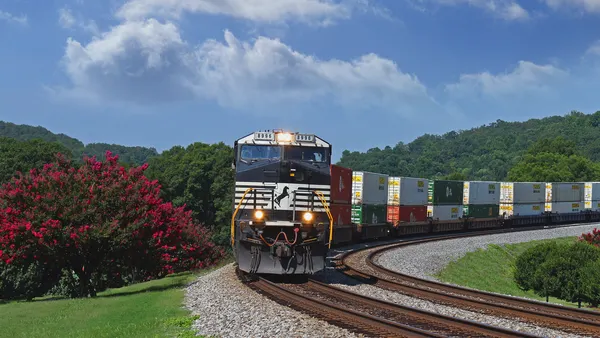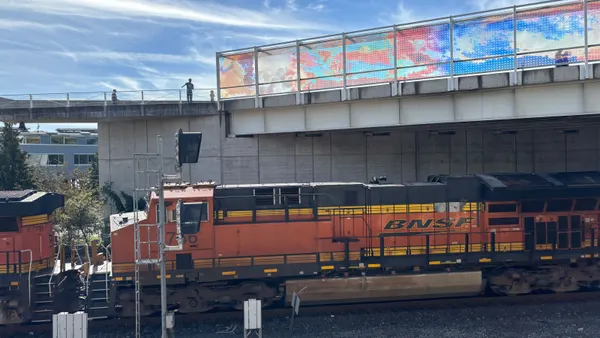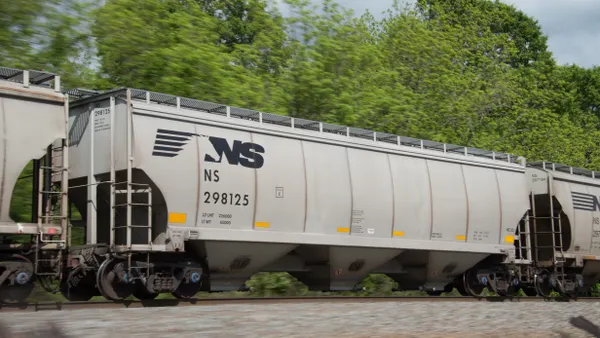UPDATE: Nov. 15, 2021: President Joe Biden signed the infrastructure bill into law Monday. Infrastructure spending related to the $1.2 trillion Infrastructure Investment and Jobs Act will be coordinated by Mitch Landrieu, former mayor of New Orleans.
"This law makes the most significant investment in roads and bridges in the past 70 years," Biden said during the bill signing at the White House. "What that means is you're going to be safer, and you're going to get there faster and we're going to have a whole hell of a lot ... less pollution in the air."
Dive Brief:
- The House passed the infrastructure bill late Friday with a vote of 228 to 206, advancing a $1.2 trillion spending package that would fund a range of infrastructure projects. President Joe Biden is expected to sign the bill in short order.
- The bill, the Infrastructure Investment and Jobs Act, passed the Senate in August. It includes $550 billion in new infrastructure spending and comprises $110 billion for improvements to roads and bridges.
- The package also creates the Office of Multimodal Freight Infrastructure and Policy within the Department of Transportation. The new office, in addition to managing certain grant programs, will assist federal, state and local governments in creating freight policies that encourage supply chain efficiencies.
Dive Insight:
Once signed, the $550 billion in new spending will be the largest new investment the federal government has made on infrastructure in decades. Passage comes at a time of congested supply chains, as retail demand keeps trucking capacity tight.
"The prioritization of our nation's fundamental transportation network will mitigate many of the supply chain challenges businesses are experiencing today," National Retail Federation President and CEO Matthew Shay said in a statement following House passage.
The infrastructure package includes "a 38% increase in road and bridge funding, and an infusion of highly-trained, younger talent into our workforce," American Trucking Associations President and CEO Chris Spear said in a statement.
Along with more funding for infrastructure repairs and new projects, the bill also creates the Office of Multimodal Freight Infrastructure and Policy, an intermodal planning authority that will develop and manage the nation's freight policy and grant programs. The office will be headed by the Assistant Secretary for Multimodal Freight, a position appointed by the president that must be confirmed by the Senate.
"Following months of supply chain disruptions, this office stands to guide investments from a national, systems-wide perspective with an eye toward supply chain efficiency, safety, and reliability," according to a statement from the Coalition for America’s Gateways and Trade Corridors. "The office’s leadership on holistic freight policy and planning will have an immediate impact and support economic competitiveness in the years to come."
The legislation adds about $100 billion in discretionary funding through a series of grant programs addressing supply chain efficiencies, the CAGTC said. One of those programs includes $2.5 billion in funding for cities to address port congestion and "improve movement of goods," according to a briefing from the U.S. Senate Committee on Commerce, Science & Transportation.
Once signed, the legislation will also boost construction markets and in turn create demand for dry van and flatbed carriers.
"The $1 trillion infrastructure spending bill ... has the potential to continue to serve not only as a backup to raise, but also extend the runway of this healthy rate environment for those [carriers] such as Daseke," CEO Jonathan Shepko said during the company's latest earnings call.
Sarah Zimmerman contributed to this story.














